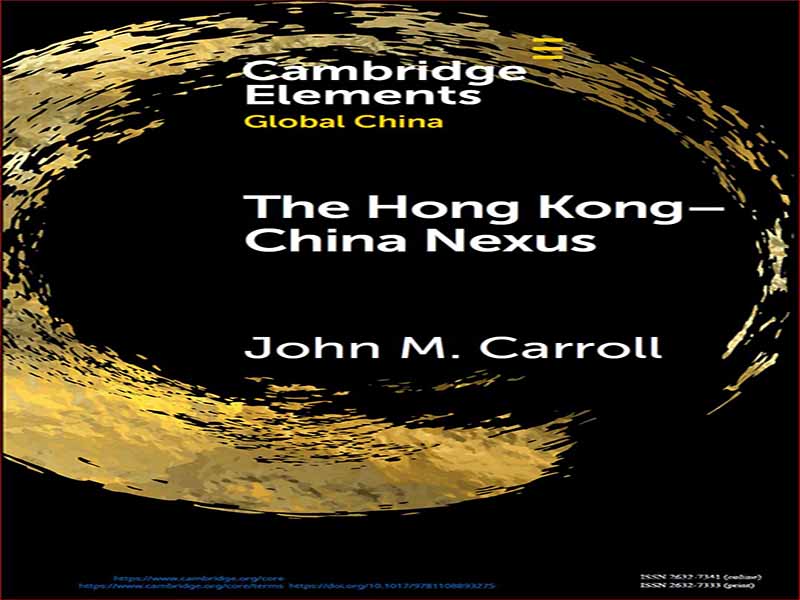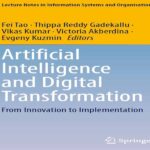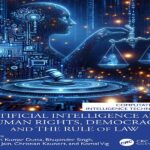- عنوان: THE HONG KONG–CHINA NEXUS
- نویسنده: John M. Carroll
- حوزه: همکاری کشورها
- سال انتشار: 2022
- تعداد صفحه: 96
- زبان اصلی: انگلیسی
- نوع فایل: pdf
- حجم فایل: 4.52 مگابایت
بازگشت هنگ کنگ به حاکمیت چین در ژوئیه 997 یک پیروزی دیپلماتیک، اخلاقی و روانی برای چین بود. به «معاهدات نابرابر» تحقیرآمیز که در ژانویه 84 با واگذاری جزیره هنگ کنگ به بریتانیا در جریان جنگ تریاک (839-842) آغاز شده بود، پایان داد. یک شبه، این مستعمره سابق بریتانیا به اولین منطقه اداری ویژه (SAR) جمهوری خلق چین (PRC) تبدیل شد. دو سال بعد توسط ماکائو که در اواسط دهه 500 توسط پرتغالی ها اشغال شده بود، دنبال شد. در بیش از دو دهه پس از آن، دولت چین مکرراً به هنگ کنگ (و جهان) یادآوری کرده است که تا چه حد ادامه رونق – در واقع، بقای آن – به حمایت و حسن نیت پکن بستگی دارد. در همین حال، از سال 997، به ویژه در چند سال گذشته، بسیاری از مردم هنگ کنگ به طور فزاینده ای نسبت به دولت چین و سرزمین اصلی به طور کلی دشمنی کرده اند و به جای چینی، خود را به عنوان مردم هنگ کنگ – هنگ کنگ یا هنگ کنگ (هونگونگ یاهن) معرفی می کنند. این شکل از خودشناسی خیلی زودتر پدیدار شده بود. اما با ادغام بیشتر هنگ کنگ با سرزمین اصلی چین، این امر حتی گسترده تر شد. به عنوان مثال، راهپیمایی اعتراضی سالانه در ژوئیه به سرعت به فرصتی برای ابراز نارضایتی از دولت های هنگ کنگ و چین تبدیل شد. در سال 998، راهپیمایان به سفر رئیس جمهور جیانگ زمین اعتراض کردند. در سال 999، فعالانی که فریاد می زدند «دموکراسی برای چین» سخنرانی هو جین تائو معاون رئیس جمهور را در مراسم رونمایی از بنای یادبود اتحاد مجدد هنگ کنگ با چین قطع کردند. در سال 2004، صدها هزار نفر به تصمیم دولت چین برای منع برگزاری انتخابات عمومی در SAR اعتراض کردند. در طول راهپیمایی 20 2، بزرگترین راهپیمایی تقریباً یک دهه اخیر، شرکت کنندگان خواسته ها و شکایات معمول خود را بیان کردند: حق رای جهانی برای هنگ کنگ و مداخله بیش از حد پکن. و تعداد اندک اما قابل توجهی از راهپیمایان شروع به تکان دادن پرچم بریتانیا و استعمار سابق هنگ کنگ کردند. این اقدامات جنجال بیشتری برانگیخت، به ویژه زمانی که یک جنبش اینترنتی خواستار تبدیل شدن هنگ کنگ به یک کشور مستقل شد. (در کل تاریخ هنگ کنگ استعماری، هیچ کس هرگز چنین خواسته ای را مطرح نکرده بود، و حتی تلاشی برای سرنگونی دولت یا بازگشت به حاکمیت چین صورت نگرفته بود.) در ماه اکتبر، معترضان پرچم های بریتانیا و استعمار هنگ کنگ را در مقابل این ساختمان تکان دادند. دفتر ارتباط دولت چین با سردادن شعارهایی مانند «ما هنگ کنگری هستیم، نه چینی». لو پینگ، رئیس سابق دفتر امور هنگ کنگ و ماکائو در شورای دولتی چین، با محکوم کردن چنین اقداماتی، مدافعان استقلال را به عنوان “احمق های محض” رد کرد. او اصرار داشت که بدون حمایت سرزمین اصلی، هنگ کنگ به یک “شهر مرده” تبدیل خواهد شد. در راهپیمایی 203، شعار جدیدی ظاهر شد: “استعمارگران چینی بیرون بروید.” از آن زمان، روابط بین هنگ کنگ و سرزمین اصلی چین حتی بدتر شده است. در سال 205، نگرانیها در مورد خودمختاری SAR زمانی تشدید شد که پنج کتابفروش متصل به یک فروشگاه محلی که کتابهای ممنوعه در سرزمین اصلی را میفروشد، ناپدید شدند و بهطور مرموزی در آن سوی مرز ظاهر شدند. در 7 ژانویه 20، یک میلیاردر چینی-کانادایی که به دلیل مدیریت دارایی های خانواده رهبران برجسته چینی شهرت داشت از هتل خود ناپدید شد و بسیاری را بر این باور گذاشت که او نیز توسط ماموران سرزمین اصلی ربوده شده است. موضوع اصلی راهپیمایی ژوئیه «یک کشور، دو سیستم: یک دروغ برای بیست سال» بود. اما راهپیمایی آن سال شامل دو شعار جدید بود: «استقلال هنگ کنگ» و «هنگ کنگ چین نیست». بر اساس یک نظرسنجی در 209 دسامبر، تنها درصد پاسخدهندگان خود را چینی میدانستند – پایینترین سطح از سال 997. قانون امنیت ملی در 30 ژوئن 2020، در طول همهگیری کووید-9 و ماهها اعتراض و ناآرامی اجتماعی در این کشور به تصویب رسید. 20 9، فقط این تنش های طولانی مدت را شعله ورتر کرده است. این امر بسیاری از مردم هنگ کنگ را متقاعد کرده است که شهر آنها قبل از سال 2047، زمانی که ترتیبات “یک کشور، دو سیستم” که وضعیت اداری ویژه هنگ کنگ را تضمین می کند پایان می یابد، خودمختاری خود را از دست خواهد داد.
The return of Hong Kong to Chinese sovereignty on July , 997, was a diplomatic, moral, and psychological victory for China. It ended the humiliating “unequal treaties” that had begun in January 84 with the cession of Hong Kong Island to Britain during the Opium War ( 839– 842). Overnight, this former British colony became the first Special Administrative Region (SAR) of the People’s Republic of China (PRC). It was followed two years later by Macau, which had been occupied by the Portuguese in the mid- 500s. In the two-plus decades since, the Chinese government has frequently reminded Hong Kong (and the world) how much its continued prosperity – indeed, its very survival – depend on Beijing’s support and goodwill. Meanwhile, since 997 but especially over the past few years, many Hong Kong people have become increasingly hostile toward the Chinese government and the mainland in general, identifying as Hong Kong people – Hongkongese or Hongkongers (Heunggongyahn) – rather than as Chinese. This form of self-identification had emerged much earlier. But it became even more widespread as Hong Kong became further integrated with mainland China. The annual protest march on July , for example, quickly became an occasion to express dissatisfaction with the Hong Kong and Chinese governments. In 998, marchers protested against President Jiang Zemin’s visit. In 999, activists shouting “Democracy for China” interrupted Vice President Hu Jintao’s speech at the unveiling ceremony for a monument commemorating Hong Kong’s reunification with China. In 2004, hundreds of thousands protested the Chinese government’s decision to prohibit general elections in the SAR. During the 20 2 march, the largest in almost one decade, the participants voiced their usual demands and complaints: universal suffrage for Hong Kong and too much interference from Beijing. And a small but noticeable number of marchers began to wave the British and former Hong Kong colonial flags. These actions stirred further controversy, especially when an internet movement called for Hong Kong to become an independent state. (In the entire history of colonial Hong Kong, no one had ever issued such a demand, nor was there a single attempt to overthrow the government or return to Chinese sovereignty.) In October, protesters waved British and colonial Hong Kong flags in front of the Chinese government’s liaison office, chanting slogans such as “We Are Hongkongers, Not Chinese.” Condemning such actions, Lu Ping, the former head of the Chinese State Council’s Hong Kong and Macau Affairs Office, dismissed advocates for independence as “sheer morons.” Without support from the mainland, he insisted, Hong Kong would become a “dead city.” During the 20 3 march, a new slogan appeared: “Chinese Colonists Get Out.” Since then, relations between Hong Kong and mainland China have become even worse. In 20 5, concerns about the SAR’s autonomy intensified when five booksellers connected to a local shop selling books banned in the mainland went missing and mysteriously appeared across the border. In January 20 7, a Chinese-Canadian billionaire known for managing assets for the families of prominent Chinese leaders vanished from his hotel, leaving many to believe that he too had been snatched by mainland agents. The main theme for the July march was “One Country, Two Systems: A Lie for Twenty Years.” But that year’s march included two new slogans: “Hong Kong Independence” and “Hong Kong Is Not China.” According to a survey in December 20 9, only percent of the respondents considered themselves Chinese – the lowest level since 997. The national security law passed on June 30, 2020, during the COVID- 9 pandemic and following months of protest and social unrest in 20 9, has only further inflamed these long-simmering tensions. It has convinced many Hong Kong people that their city will lose its autonomy well before 2047, when the “one country, two systems” arrangement that guarantees Hong Kong’s special administrative status will end.
این کتاب را میتوانید از لینک زیر بصورت رایگان دانلود کنید:
Download: THE HONG KONG–CHINA NEXUS





































نظرات کاربران